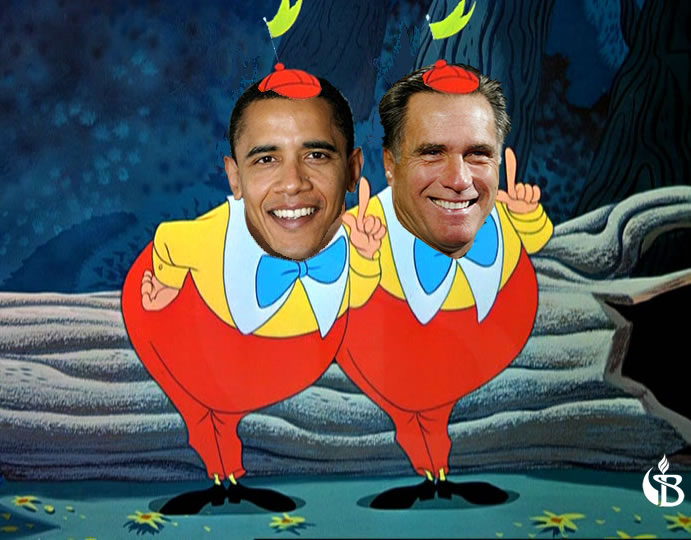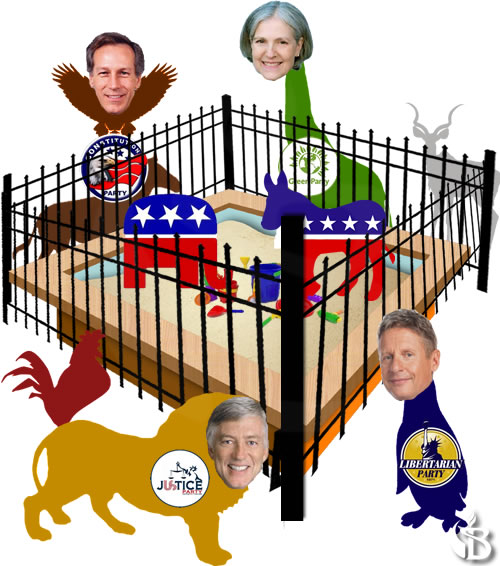
Shortly after I wrote Liberation Politics And The Future Of Immigration Reform last summer, a few colleagues questioned my position.
I asserted the two-party system is no longer effective for addressing tough political issues like immigration reform.
I explained although differences between one party’s Tweedle Dee and the other party’s Tweedle Dum may be minor, the two-party indoctrination has conditioned voters to perceive the differences as distinct as night and day.
One San Diego attorney, a friend of sorts, wrote, “Your passion for immigration, Carlos, distorts your view of political reality.”
His view, as one might suspect, was not unbiased. He noted my criticisms about the president were unwarranted in light of Republican opposition to immigration reform.
Actually, my article did not focus on the president.
Rather than undermine my position, his argument demonstrated it.
Tweedle Dee, Tweedle Dum:
More Questions Than Answers
In just a few days, the 2012 election season will end.
Thank goodness.
I never thought I would write something like that.
I grew up believing government was the solution to our country’s ills, before I was old enough to vote.
I accepted the proposition that electoral politics was a vehicle for positive change.
I overlooked a basic truth: government is run by individuals temporarily holding high level positions. If these individuals are unwilling to put their temporary titles on the line to fight for change, government, under their leadership, follows a path of least resistance.
Political cowardice.
I will be re-energized when the election ends not because a particular party or specific candidate wins.
Instead, in my role as a Riverside immigration attorney, I will be glad to get the task of immigration reform back on track.
Regardless whether Tweedle Dee or Tweedle Dum wins, after winners and losers quit insulting each other and threatening payback, those of us who deeply care about the subject can begin anew fixing our broken immigration system.
In other words, the real work re-begins after November 6, 2012, as the cheap talk (hopefully) subsides.
What Will It Take To Pass
Immigration Reform?
Increasingly, over the past few months, clients have asked me if it makes any difference who wins the election.
My answer is definitive.
“Maybe.”
When I tell them, “I don’t know,” their faces grow somber.
I know the feeling. It’s a long road ahead.
The road is uphill.
A recent ABC News Univision article asked, “Could Romney Pass Immigration Reform In His First Year?”
The article laid out four keys:
- 1. A Consensus On What Constitutes Reform
- 2. Cooperation from Congress
- 3. An Improved Economy
- 4. The Candidate Keeps Promises Made During the Campaign
Although the article focused on Romney, the four points are equally applicable to Obama’s promise to achieve immigration reform, if re-elected, by 2013.
A daunting endeavor, to say the least.
Candidates who follow the least resistant path will not be up to the challenge.
Skip The Line For President?
Earlier this weekend, in an article entitled “Latino Vote: Neither Candidate Understands Us”. syndicated columnist Ruben Navarrette called upon Latino voters to skip casting their ballots for either Obama or Romney.
He urged Latinos to vote on Tuesday, for every office except president.
All voters, regardless of ethnicity, for whom immigration is a hot topic issue, should listen carefully to his arguments.
“At the end of this contentious presidential contest between Barack Obama and Mitt Romney,” Navarrette wrote, “our only consolation is that one of these guys is going to lose. Both deserve to.”
He explained Latinos should “skip the line” for president because:
- In the name of self-respect and to declare that they’re sick and tired of choosing the lesser of two evils—because, they have come to realize, the lesser evil is still evil.
- The choice is between a challenger who wants illegal immigrants to “self-deport” and an incumbent who became an expert at forcibly removing them.
- While it sounds as if both campaigns have come around to the importance of the Latino vote, all they’ve come up with are better ways to manipulate Latinos.
Moreover, skipping the line is warranted because “the two major political parties have become like Visa and MasterCard, more alike than they are different, and neither one has a dime’s worth of respect for America’s largest minority.”
In closing, he adds:
“This is our choice? The lesser of two evils? The incompetent versus the mediocre?”
“What an insult. Don’t accept it. Take a stand. Send a message. Demand better. Skip the line.”
Or Vote For A Third Party Candidate?
Overall, I agree with Navarrette.
Being an immigrant advocate, as well as a former insider political activist, I have long espoused similar dissent. However, in my view, the core issue runs deeper than just Obama and Romney.
The bigger problem is the two-party system.
There is another way to take a stand and send a message to the two parties.
Vote for a third party candidate.

By voting for an independent candidate, we send a message to the two big parties that our refusal to support them is not a short term fad. It’s an acknowledgment the two party system is no longer an effective mechanism for addressing the diverse needs of the American public.
As this election has shown, the number of politically disconnected voters is huge and growing.
In spite of the expanding frustration with the two party system, many consider voting for a third party candidate off limits.
We are encouraged to skip the line.
To make real political change happen, we must change our loyalty, conscious or subconscious, to the two party system.
Even if independent challengers only garner 5% of the vote, that 5% could make the difference between which candidate wins the election.
More significantly, this 5% is political leverage, the type of leverage which could force political change on important issues – like immigration reform.
It sets the stage for 2016.
By setting the stage for a 10% insurgency in 2016, the two parties will be put on notice that they’ll need to change their manipulative ways or face a larger dissent in future elections.
It’s not too late to vote for a third party candidate in this year’s election.
There’s still time to pull out your election pamphlet and read about the lesser known candidates. Go to their websites. Compare their platforms to those of Obama and Romney.
You might be pleasantly surprised.
Some of them have a much better and comprehensive grasp of immigration issues than the candidates ordained via the two party system.
Ultimately, whether you skip the line or vote for a third party candidate, you’re taking a stand.
And, in my view, that’s a good thing.
By Carlos Batara, Immigration Law, Policy, And Politics




